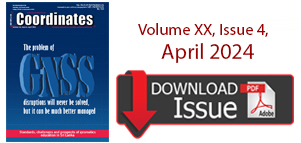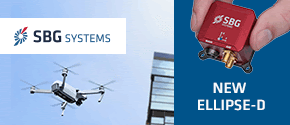Articles in the News Archives Category
EU and the Republic of Korea seal their agreement
During the EU/South Korea summit held in Helsinki, the two parties formally signed an agreement on cooperation on the European satellite radio navigation programme GALILEO. The agreement provides for numerous areas of co-operation, including cooperative activities in the areas of scientific research and training, industrial cooperation, trade and market development, standards, certification and regulatory measures. http://europa.eu.int
Innovative battlefield learning experience for soldiers
The Singapore Armed Forces (SAF) has introduced an innovative training and learning system for its soldiers called Battlefield Instrumentation (BFI). Utilising modern laser and informationcommunication technologies, BFI System brings together soldiers, weapon systems and fighting platforms. It uses the GPS, computer simulation and data communication to record details of battlefield engagements between opposing forces. www.channelnewsasia.com
German government makes funds available for Galileo development work
The German federal government will provide funds to the tune of 2.5 million Euros for research and development work in Rostock on the European satellitebased navigation system Galileo.
In the course of a visit to the Rostockbased technology company RST, Wolfgang Tiefensee, the Federal Minister responsible for promoting the industries of the eastern federal states that used to make up the German Democratic Republic, said that the groundwork R&D in the field of aerospace technology carried out by companies in Mecklenburg West-Pomerania was of an outstanding quality. Substantial funds would now be invested in Galileo application research, he added.
Within the context of research undertaken by RST, four transmitters will be set up in the port of Rostock capable of giving off Galileo signals. During the test phase the signals, which allow the receiver to pinpoint the position of the sender exactly, will be picked up by a ship of the ferry line Scandlines. www.heise.de
Arirang 2 sends first photographs
A multipurpose satellite that South Korea launched into space in July, has sent back its first photographs, proving that the images provided by Arirang 2 are vivid enough to distinguish small objects on the ground. The Ministry of Science and Technology and the Korea Aerospace Research Institute (KARI) unveiled the images from the high-resolution cameras of Arirang 2.
http://english.hani.co.kr
China ‘tightens’ control over foreign surveying, mapping…
China will step up supervision of foreigners who conduct surveys and map areas of the country. Foreign organizations and individuals, who engage in surveying and mapping in scientific research and teaching programs, travel or exploration, must obtain approval from the government and accept supervision, the State Bureau of Survey and Mapping said.
The bureau notice said that foreigners who illegally survey, gather and publish geographical information on China will be severely punished. Chinese partners or translators will be fined if they fail to stop illegal mapping activities as soon as they find out about them. http://english.people.com.cn
Glonass full deployment by 2010
Russia’s 24-satellite navigational and GPS, Glonass, will be fully deployed by 2010 as per Russia’s Defense Ministry. The ministry’s press office said the development and use of Glonass was discussed in Moscow at a meeting between Deputy Prime Minister and Defense Minister Sergei Ivanov and members of a government military commission. Also discussed were ways to improve the competitiveness of navigational services, the mass production of navigational equipment for consumers, as well as legal issues. http://en.rian.ru
Siemens wireless modules XT75 and XT65
In December 2006, the Siemens Communications Group, Munich will bring to market two new modules for tracking and navigation applications: the XT75 and the XT65. Both modules contain a GPS receiver that allows global positioning, and EDGE or GPRS technology for transmitting data to a mobile device. The modules are based on JavaT and have quadband capability, which means they can be used in all GSM mobile networks worldwide.
www.siemens.com
Blue Marble introduces FlexLM licensing
Blue Marble Geographics has announced an update to their Geographic Calculator software application aimed at improving GIS data management efficiency. The Geographic Calculator is known for its easy-to-use interface that allows the user to perform simple coordinate transformations while at the same time allowing for very elaborate in-depth conversions.
www.bluemarblegeo.com
Five Nation Consortium focuses on receivers for Galileo GPS system
British consultancy PA Consulting Group, London, is to lead a five nation consortium to look into the enabling technologies needed to develop receivers for Europe’s Galileo GPS location based system. The two year project, funded to the tune of Euros 6 million by the European Commission through grants from the sixth Framework Programme, is dubbed GREAT, for Galileo REceiver for the mAss market. The Consortium comprises Spanish group Acorde, a specialst in RF design for satellite and communications systems; German Aerospace Center DLR, the Tampere University of Technology, specifically the Finnish University’s group specializing in algorithm design for GNSS systems; and u-blox AG – a Swiss fabless developer and manufacturer of GPS chipsets and GPS receiver modules. The project will comprise three distinct phases – core technology development, prototyping and testing – achieving major blocks of demonstrable baseband IP that, the group says, will allow further developments to be kick-started. Initial target of the project is the development of front-end RF designs, as well as the algorithms and baseband technology to allow the Galileo signal to be used in indoor locations. www.eetimes.com
India cripples RTI act
The Union Cabinet on July 20 gave its approval for the introduction of a Bill amending the Right to Information Act, 2005, to exclude file notings in a few areas, in the monsoon session of Parliament. The proposed amendments would “remove ambiguities and make the provisions of the Act effective and progressive,” Information and Broadcasting Minister Priyaranjan Dasmunsi said. The decision follows objections from government organisations such as the Union Public Service Commission that detailed file notings at the Undersecretary and Joint Secretary level cannot be disseminated. “Such exemptions have been granted in the United States, United Kingdom and Australia,” Mr. Dasmunsi said.
Civil society organisations, which have been crucial in the enactment of the RTI Act, have reacted sharply to the decision. According to Aruna Roy of the Mazdoor Kisan Shakti Sanghathan, “Section 8 [exemption clause] is an overarching section. If there is a problem with file notings related to the UPSC, why doesn’t the Government put it under that schedule? This is a deliberate attempt to cover up for acts of corruption. There is fear among bureaucrats that the widespread use of the RTI legislation will end the arbitrary use of power. I really think this move will weaken the Act and the UPA’s promises of a free and accountable government.” However, the PMO clarifies that the controversy over the curtailment of the right to access file notings via the Right to Information Act seems to be misplaced. In fact, the so-called ‘striking down’ of the right to access notings on government files by the Union Cabinet, was actually what would allow access to file notings. PM Manmohan Singh’s office has issued an exhaustive clarification to point out that the changes were not ‘‘retrogressive’’ and the criticism was ‘‘misplaced’’ and based on ‘‘an incomplete knowledge of facts.’’







 (5.00 out of 5)
(5.00 out of 5)